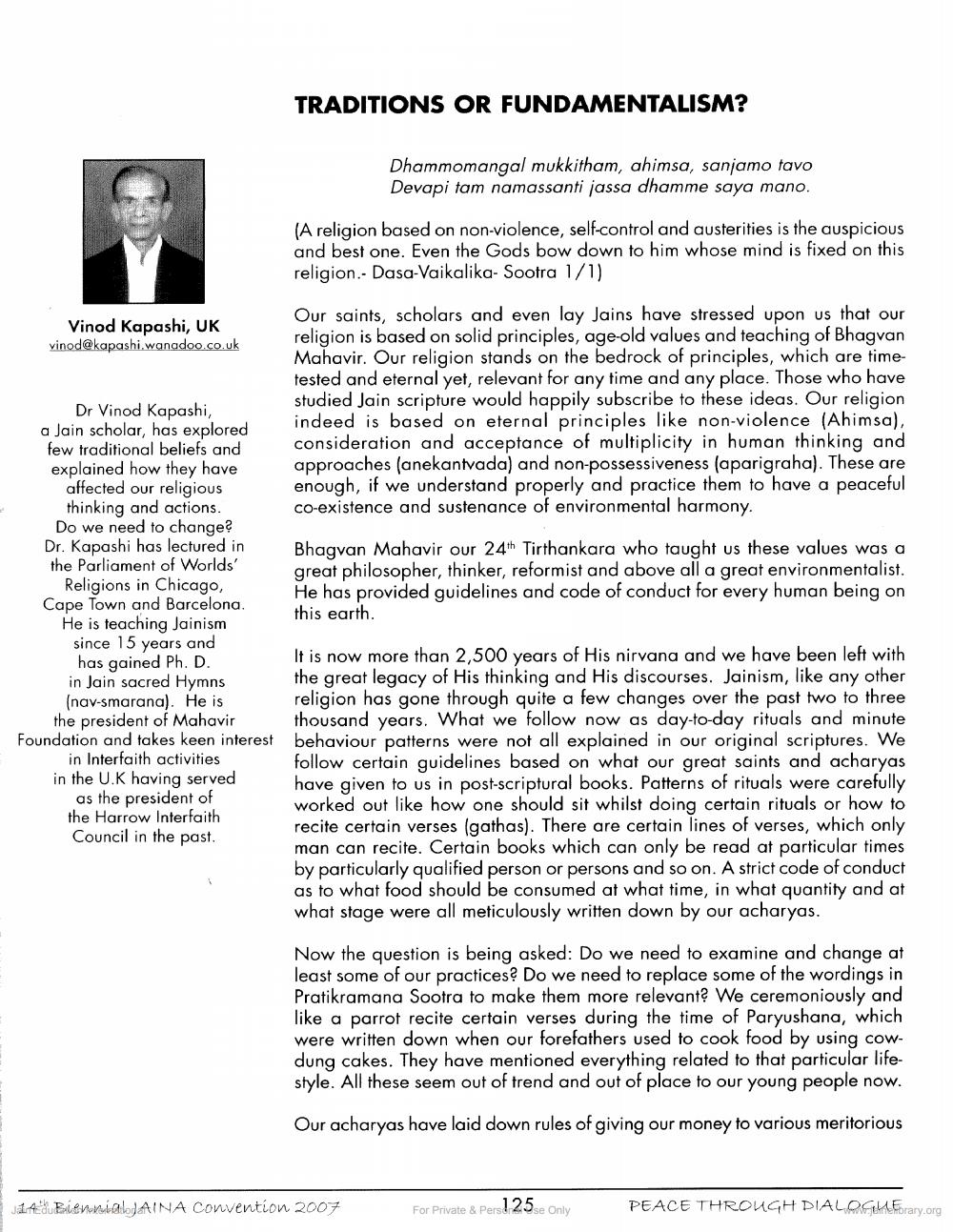________________
TRADITIONS OR FUNDAMENTALISM?
Dhammomangal mukkitham, ahimsa, sanjamo tavo Devapi tam namassanti jassa dhamme saya mano.
(A religion based on non-violence, self-control and austerities is the auspicious and best one. Even the Gods bow down to him whose mind is fixed on this religion - Dasa-Vaikalika-Sootra 1/1)
Vinod Kapashi, UK
Our saints, scholars and even lay Jains have stressed upon us that our vinod@kapashi wanadoo.co.uk
religion is based on solid principles, age-old values and teaching of Bhagvan Mahavir. Our religion stands on the bedrock of principles, which are time
tested and eternal yet, relevant for any time and any place. Those who have Dr Vinod Kapashi,
studied Jain scripture would happily subscribe to these ideas. Our religion a Jain scholar, has explored
indeed is based on eternal principles like non-violence (Ahimsa), few traditional beliefs and
consideration and acceptance of multiplicity in human thinking and explained how they have approaches (anekantvada) and non-possessiveness (aparigraha). These are affected our religious enough, if we understand properly and practice them to have a peaceful thinking and actions. co-existence and sustenance of environmental harmony. Do we need to change? Dr. Kapashi has lectured in Bhagvan Mahavir our 24th Tirthankara who taught us these values was a the Parliament of Worlds'
great philosopher, thinker, reformist and above all a great environmentalist. Religions in Chicago,
He has provided guidelines and code of conduct for every human being on Cape Town and Barcelona. He is teaching Jainism
this earth. since 15 years and has gained Ph. D.
It is now more than 2,500 years of His nirvana and we have been left with in Jain sacred Hymns
the great legacy of His thinking and His discourses. Jainism, like any other (nav-smarana). He is religion has gone through quite a few changes over the past two to three
the president of Mahavir thousand years. What we follow now as day-to-day rituals and minute Foundation and takes keen interest behaviour patterns were not all explained in our original scriptures. We
in Interfaith activities follow certain guidelines based on what our great saints and acharyas in the U.K having served
have given to us in post-scriptural books. Patterns of rituals were carefully as the president of
worked out like how one should sit whilst doing certain rituals or how to the Harrow Interfaith Council in the past.
recite certain verses (gathas). There are certain lines of verses, which only man can recite. Certain books which can only be read at particular times by particularly qualified person or persons and so on. A strict code of conduct as to what food should be consumed at what time, in what quantity and at what stage were all meticulously written down by our acharyas.
Now the question is being asked: Do we need to examine and change at least some of our practices? Do we need to replace some of the wordings in Pratikramana Sootra to make them more relevant? We ceremoniously and like a parrot recite certain verses during the time of Paryushana, which were written down when our forefathers used to cook food by using cowdung cakes. They have mentioned everything related to that particular lifestyle. All these seem out of trend and out of place to our young people now.
Our acharyas have laid down rules of giving our money to various meritorious
du BiennialJAINA Convention 2007
For Private & Pers1 25. Only
PEACE THROUGH DIALOGM Erary.org




